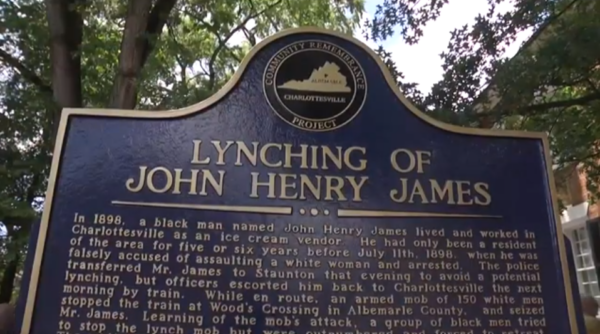Descendants of a Black man lynched after being accused of raping a white woman in 1898 call their ancestor’s exoneration from a judge 125 years later a “little drop of justice” in an emotional response to the news.
John Henry James was murdered by a white mob in Charlottesville, Virginia after being accused of hitting a 20-year-old Julia Hotopp, a white woman from a wealthy local family, and forcing her to the ground.

Longtime newspaper The Daily Progress published a report about the alleged assault on July 11, 1898, with the headline “Atrocious and outrageous” and an account of what happened from Hotopp. She described the person who struck her as “a very black man, heavy-set, slight mustache, wore dark clothes, and his toes were sticking out of his shoes.”
Hotopp gave varying reports to other local newspapers. In one report, she said she was able to fend off her attacker and wasn’t sexually assaulted. In another, she recounted being gruesomely assaulted.
It didn’t take long for white residents in the area to pin the crime on James, an ice cream vendor, who was sitting in a barroom that day, even though he only “somewhat” matched the description.
James was arrested and taken to jail that day, then smuggled to another jail in Staunton by night for “safety” reasons. The next day, July 12, authorities attempted to transport him back to Charlottesville for a grand jury hearing, but a white mob tracking James seized him when the train stopped.
They hung him by a noose before opening fire with multiple pistols while his body was dangling in the air, according to reports. A Black coroner found 30 bullet holes in his body.
The Daily Progress reported that “he was asked if he wished time to pray,” before he was murdered, to which James reportedly responded, “Before God, I am innocent.”
Dozens of Black men also followed to protect James but were outnumbered and forced to retreat, according to reports at the time.
The same day that James was lynched, an Albermarle County grand jury indicted him on the charge of criminal assault. His murder is still recounted as the most famous lynching in Charlottesville to this day.
On July 12, 2023, 125 years to the day that James was lynched, Albemarle County Circuit Court Judge Cheryl V. Higgins on Wednesday dismissed the century-old indictment.
Higgins ruled that the grand jury intentionally and improperly issued the indictment, making “a mockery of the judicial system.” He called the indictment a “cause to lynch a man simply because he was Black.”
July 12 was also the birthday of James’ descendant, Melvin Grady, who chose to celebrate surrounded by family members in the Virginia courtroom where the ruling came down that cleared James’ name.
“This is just one little drop of justice,” Grady told local newspaper Charlottesville Tomorrow. “Knowing and traveling, I was fine. But here, it really hit me. I’m going back to imagine a guy who didn’t do sh*t — pardon my language — getting lynched, no evidence whatsoever. I’m telling you, it’s powerful. I cried in there, hearing the testimony, the ruling. It was powerful. I feel honored to be a part of this.”


